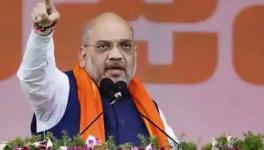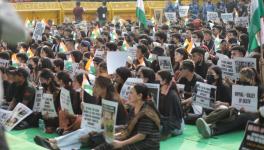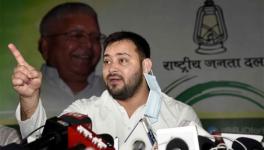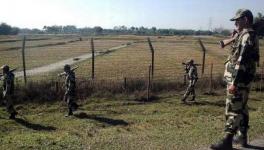Fear of Govt Betrayal Propels Unrest in North-east
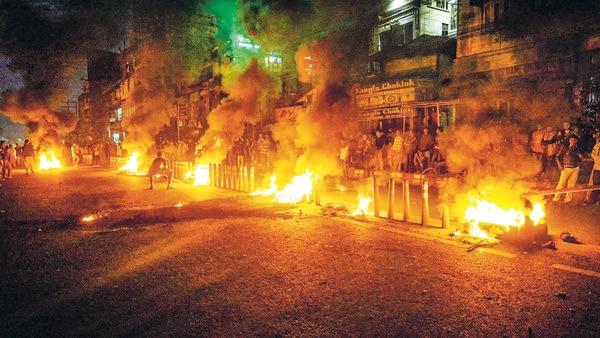
Image Courtesy: PTI
The North East is boiling in fury. There is fierce opposition by indigenous people to the passage of the Citizenship Amendment Bill into law. Tensions remain high six days after the bill received the President’s assent. As soon as the law came into force, thousands took to the streets in protest in Assam, defying the curfew imposed by the government. Clashing with the police and special forces, they pulled down political billboards and set vehicles, bus terminal and trains on fire. Restrictions on use of internet services remained though the government claimed some restrictions were eased.
On Sunday, some estimated that at least six protestors have died in Assam, four of them shot by the police, and hundreds more injured. In Meghalaya, night-time curfew has been imposed in the capital Shillong. SMS and Mobile internet service has been blocked for two days. The tribal dominated areas in Tripura continue to remain tensed suspending the SMS and Internet services till Friday. In Arunachal Pradesh, a serious fuel crisis has hit Itanagar after the fuel depots ran out of stock. A three day bandh was organised by the Manipur People Against Citizenship Amendment Bill (MANPAC) in Manipur urging the people to come out on the street to protest against the bill.
Under the new Citizenship (Amendment) Act, people from six communities—Sikhs, Hindus, Christians, Parsis, Jains and Buddhists fleeing religious persecution from Afghanistan, Pakistan and Bangladesh will be legally recognised as Indian citizen. Although the government has justified the asylum on humanitarian grounds, the people in the North-east have refused to accept it. Protestors in the region apprehend that giving citizenship to immigrants, in the name of religious asylum, will change the demography in the region, increase the competition for resources, marginalise the indigenous people and ultimately threaten the identity of the people.
Opposition parties argue that the new citizenship act violates Article 14 of the Constitution and is against the secular fabric of India. By making religion the basis of citizenship, it not only discriminates against the Muslims but also demeans them as second-class citizens by providing preferential treatment to other religious groups. In fact, Muslims, who are in minority and face persecution in Myanmar and Sri Lanka, have been excluded from the bill.
While the bill has proved controversial across the country, it has been particularly sensitive in Assam. The government’s need to expedite this law through Parliament became evident after the National Register of Citizen (NRC) exercise in Assam—which was meant to prove the Assamese ancestry of its residents—left 1.9 million people, a majority of them Hindus, without citizenship. Their exclusion meant that they risked being sent to detention centres. With this new legislation, an estimated 1.5 million Hindus who were excluded by Assam’s NRC have become eligible for citizenship.
People in Assam are angry because they argue that the NRC was meant to filter out illegal immigrants who have been residing in Assam but who had entered the state after midnight on 24 March 1971. The NRC, they say, was conducted to address the issue of asylum-seekers and to protect the identities of the indigenous people of the North-east in the face of unchecked immigration from neighbouring countries. It was never meant to discriminate people on religious grounds. Thus, they consider the new law an utter failure of the government in delivering what it promised to the people of the region.
It must be noted that in its 2014 election manifesto, the Bharatiya Janata Party (BJP) had promised to grant citizenship to Hindu refugees from Bangladesh and Pakistan. The BJP reiterated its commitment to the Citizenship Amendment Bill in its 2019 election manifesto.
Many have called the citizenship bill a “black bill” that will stoke divisive fires in the name of religion all over the country, as it has done in the North-east. Hitendra Nath Goswami, Speaker of the Assam Legislative Assembly, has said that there are doubts on the real intention behind the new law, since there is a strong possibility of its creating a communal divide. Former Assam chief minister Prafulla Kumar Mahanta has also called the government’s new citizenship rules a “divisive tool” to create a Hindu-Muslim divide, which must be scrapped immediately. He also called it as a threat to the composite culture of the North-east.
At present, the Citizenship Act does not apply to Arunachal Pradesh, Mizoram and Nagaland, which fall under the Inner Line Permit area; and tribal areas of Assam, Meghalaya, Mizoram and Tripura which are included in the Sixth Schedule to the Constitution. Under the new law, the Inner-Line Permit or ILP has been extended to Manipur on Wednesday with President Ram Nath Kovind signing the order in this effect.
But these exemptions could not deter unprecedented violent protests in the North-east against the amended citizenship law of 1955, as the fear and uncertainty of losing the special status of North-east under Article 371 still looms in the region, especially after the abrogation of Article 370 on 5 August. Article 370 had protected the special status of the erstwhile state of Jammu and Kashmir until the government split the state into two Union Territories, and revoked the protections in August. The region has been under strict lock-down ever since.
Hawa Bagang, president of the All-Arunachal Pradesh Student’s Union says, “Although the BJP government has assured that Arunachal Pradesh, Mizoram and Manipur stand fully excluded from the new citizenship rules, there is speculation that it may turn against this promise in future. After what they have done to Kashmir, how can we be sure they will not do the same to us?”
Similarly, Ninoto Awomi, president of the Naga Students Federation, says, “During our meeting with the Home Minister on 3 December, he told us that Nagaland will be exempted from the purview of the Citizenship Amendment Bill. However, we worry that if it is implemented even in small pockets of the North-east, it will affect the entire region since borders are very porous here.”
The fury in the North-east against the new citizenship law will continue to manifest in protests across the North-east unless the fundamental problems of identity and right to self-determination, raised time and again, are addressed. For many in the North-east, the revocation of protections guaranteed to Kashmir by Article 370 was a signal of times to come in the North-east. Perhaps, as a confidence-building measure, the government ought to reconsider the special status of Kashmir. That just might reassure the North-east of its intentions.
Get the latest reports & analysis with people's perspective on Protests, movements & deep analytical videos, discussions of the current affairs in your Telegram app. Subscribe to NewsClick's Telegram channel & get Real-Time updates on stories, as they get published on our website.













